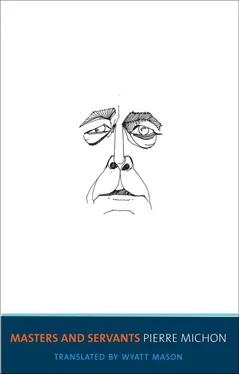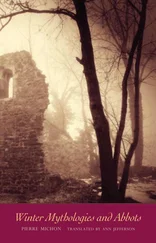Pierre Michon - Masters and Servants
Здесь есть возможность читать онлайн «Pierre Michon - Masters and Servants» весь текст электронной книги совершенно бесплатно (целиком полную версию без сокращений). В некоторых случаях можно слушать аудио, скачать через торрент в формате fb2 и присутствует краткое содержание. Год выпуска: 2013, Издательство: Yale University Press, Жанр: Современная проза, на английском языке. Описание произведения, (предисловие) а так же отзывы посетителей доступны на портале библиотеки ЛибКат.
- Название:Masters and Servants
- Автор:
- Издательство:Yale University Press
- Жанр:
- Год:2013
- ISBN:нет данных
- Рейтинг книги:3 / 5. Голосов: 1
-
Избранное:Добавить в избранное
- Отзывы:
-
Ваша оценка:
- 60
- 1
- 2
- 3
- 4
- 5
Masters and Servants: краткое содержание, описание и аннотация
Предлагаем к чтению аннотацию, описание, краткое содержание или предисловие (зависит от того, что написал сам автор книги «Masters and Servants»). Если вы не нашли необходимую информацию о книге — напишите в комментариях, мы постараемся отыскать её.
Masters and Servants — читать онлайн бесплатно полную книгу (весь текст) целиком
Ниже представлен текст книги, разбитый по страницам. Система сохранения места последней прочитанной страницы, позволяет с удобством читать онлайн бесплатно книгу «Masters and Servants», без необходимости каждый раз заново искать на чём Вы остановились. Поставьте закладку, и сможете в любой момент перейти на страницу, на которой закончили чтение.
Интервал:
Закладка:
We do not know if Saint Martin witnessed the scene, and if he had, whether he might have stood closer to the farmer or to Lorentino.
Lorentino considered all of this in the big room down below, the studio, holding the terrified beast that hadn’t much time left, that wouldn’t look indifferently at the world much longer. He asked himself if he had enough pigment left over from the last commission; he decided he had. And the motif for this preposterous commission, to which he gave thought prior even to killing the pig, scarcely required a second thought: he decided that he would do the saint at the expected moment, when on horseback or on the ground he cuts his cloak in two and offers the beggar a half worth all heaven; and, of course, Roman, warriorlike, armored. But as models for these two figures, their resemblance to men, he was not yet sure. First he thought of giving the beggar his own face, and the saint that of dead Piero; but something in this idea made him ashamed of himself. Keeping himself in the role of the beggar, he thought that the saint could have the face of the farmer, twenty years younger; he felt ashamed of this idea too, a painter doesn’t need a farmer. So he resigned himself to being absent from this painting in which he wasn’t of much use, and decided to give the saint his master’s face, in his prime, on his scaffolds in San Francesco amongst the Constantines, the queens of Sheba, when he was already forty but would look younger in the memory of an old disciple; and so for the beggar, the wily, dumbfounded face of the farmer. But maybe he would do something completely different, it hardly mattered. Lorentino was a little annoyed, was trying to avoid these rapid little eyes looking up at him; he heard the wind whistling outside. He didn’t start on the painting that night, he had to kill and dress the beast first, which he did.
And Vasari, regarding the details of this miraculous little skit — which was more out of the old Flemish masters and their beasts, their gifts, their more clement God, and their cold country than out of the Platonic dispensary where he painted too-plump Virtues and helmeted young boys in the employ of lascivious old men — Vasari doesn’t mention the particulars of these culinary operations. He stops there. But in his Life of Piero della Francesca , where our story is told in ten lines, in a little aside about the faded face of Lorentino d’Angelo, which didn’t warrant the ten or twenty little pages necessary for the unfurling of a Life , Vasari leaves it as understood, or rather says nothing about it as though it goes without saying, that the old disciple was happy about this little miracle, was dazzled and aware that a saint had offered, in the flesh, a pig to his children for Carnival; Vasari leaves it as understood that the painter thanked his blessed art for another triumph of theological order, Golden Proportions, and the way of the world, all of which had manifested in a pig; Vasari leaves it as understood that Lorentino cried tenderly; that proudly he had produced this pig before his children. And that they all had fallen to their knees. Vasari leaves all of this as understood.
One can disbelieve Vasari.
HIS MOTHER HAD NAMED HIM little Lorenzo, since he wasn’t growing quickly: Lorentino. In this inner theater in which we play the leading role, not always the lead, but at least from time to time, in order to survive — he appeared under the name of Lorenzo. Lorenzo d’Angelo. But he bore this name only for his own use; the neighbors and the commissioners always called him Lorentino, even though they didn’t mean it in the same way his mother had, they didn’t say it sweetly, nor spitefully either, they just said it plainly; which was only fair. His mother was dead, his hair had gone gray, and he was usually out of breath when he spoke, but the Aretinians always called him Lorentino and it is fairly certain that he recognized himself in this name and answered to it. It’s only fair, thinks Lorentino, and you can see him, sitting in the upper room, surrounded by his family, having taken off his bonnet to think. It’s a domestic scene in chiaroscuro, and Lorentino, who learned la pittura chiara from Piero, has no interest in this half-light. Everyone is preparing the meal and he, for a moment, is resting. The frozen wind from the Verna whistles louder past the windows; in his street, beneath the dark cypresses, the farmer runs through the black. You see night following behind him along with the remains of day, following behind him like dogs, one black, one white. The children are smiling, they thank their father for not having lied, they’ve gotten what they wanted. Lorentino is smiling at them, thinking of something else; he is asking himself about this little Lorenzo and what had been done with him. And so he looks at Angioletta, his tall and beautiful daughter who is still with them, who doesn’t yet have a husband though men revolve around her like shadows around the sun. And little Lorenzo asks himself, or perhaps it’s Lorentino who asks Lorenzo, why this perfect object sprung from his loins hadn’t instead come from his art; why neither the pleasure he’d had within Diosa nor this flesh fallen from her hadn’t transformed Lorentino into Lorenzo. Without speaking, he asks Angioletta which sacrament addresses the art of painting and how it may be used to gain a better name than that which one is christened; this he asks Angioletta, who is painting made flesh, but who isn’t paint.
The wind whistles; in the light of the great fire Angioletta sits across from Lorentino. Without speaking, he asks: What will remain of you, beautiful face? A soul? What mad law drives us to possess this nothing in moving bodies? Why can’t you remain eighteen years old for an instant under the fleeting midday light, beneath the shadowy lilacs? And why didn’t I know how to paint you — you — not your excitement at soon having meat on your tongue, not your features that will change once you leave here and a man has had his way with you, but you, your youth, your force, your unfettered soul, when you were twelve years old, when you were fifteen, while you are eighteen, royal in the midday mist, gloomy like midday, brilliant like midday, like all the ones like you whom he painted up above, on the scaffold, in the shadows, whom from the opposite wall I could see while I did my touch-ups, my clumps of trees, my icy highlights on icy Oriental hats, when I was fifteen and watched him work, watched him not looking at anyone, watched him remain endlessly still and at last rise with his hand extended before him, drawing out from within a limestone wall — a wall that itself wasn’t miraculous, that we had prepared with our own hands before he arrived, kidding around just as you would have expected, Luca, Melozzo, the others, and I — thus drawing forth some Revelation, massive theological maidens, Angiolettas more real than you who bears this name, servants, but servants who serve only light made flesh, the king of midday, because the midday mist and the hand of Piero had made it so. My own hand isn’t good for anything but killing a pig, painting a peasant saint for a peasant. A saint with the name of a bear.
He would have preferred Saint Francis, Saint Augustine, or Saint Jerome, of course, or a cleric in a cardinal’s hat. He rose: Bartolomeo needed his help and was calling for him. Bartolomeo lived with them. He was the only apprentice, his only student, all that remained of a studio that had never flourished anyway. The disciple had a student of his own now; but he didn’t want to think about that. He hadn’t taught Bartolomeo very much, although he had taught him all there was to know about the profession, the tricks of the trade and the Florentine theory, how to mix plaster, how to mix ultramarines with lime and to read Alberti; that it isn’t life, but art, that one must search for in painting; that you shouldn’t make backgrounds gold; that scenes of earth should convey the same idea as those of heaven; any number of mathematical trifles. But all that really counted he hadn’t taught him; because what counts isn’t conveyed with words, it is observed and, like the midday sun, wordlessly overwhelms anyone who sees it and remains forever in the body of an apprentice who watches you do nothing for hours until suddenly you rise, extending a theological hand that blesses the wall with a single stroke, and once again sit, meditating, frowning, discontent, perhaps that’s all painting is, the perfection of a gesture and instant Revelation; and discontent that this gesture that has just impeccably brought a face to close — a pause, an élan , a midday cloud over the queens of midday — isn’t accompanied by the trumpets of Judgment, ringing out in a little church in Arezzo, tossing disciples to the ground while you yourself fill to bursting with the dimensions of the universe, eardrums bursting and limbs lifeless, but God in the flesh beating in your heart grown suddenly too small for Him. He hadn’t given Bartolomeo the responsibility of being a master. He had spared him this image from a sweet dream or a nightmare, from a sweet dream and a nightmare that pulls you forward toward weightless things, shows them to you, prohibits you from looking elsewhere; and as for the passing shadow that steals your taste for bread, which perches on your shoulders with the weight of every painter interred since Zeuxis and all their tombstones, so much weight that weightless things seem almost in reach, but they move too quickly, you cant seize them precisely because of this great weight beneath which you labor and which spurs you to seize them; this ghost one drags all the way to death, which during its life dragged along its own, its own that you thus drag part of as well, as Piero dragged Veneziano, had been embarrassed and driven forward by it, this Veneziano that Lorentino hadn’t known but whom Piero venerated and therefore whose carcass and tombstone Lorentino carried along with Piero’s; and who knows what names there were beneath Veneziano, Lorentino didn’t know these names, but he felt the weight of the stones upon which the names were engraved. Bartolomeo wouldn’t have ghosts at his back, not even horsemen saddled with tombstones; he wouldn’t be a good painter. But Lorentino — who bore Piero and all the armies of Constantine, Heraclius, their armor, the miters from the Orient, the cavalry, and even the struts for Milvius Bridge over which they rode — for all that, was Lorentino himself a good painter? My poor Bartolomeo. Lorentino looked at him for a moment; he was nearly a farmer, he too, short with short hands; he came from la Pieve a Quarto , from nowhere, he had more of a taste for Angioletta’s shapely limbs than he did for Golden Proportions, and he was too full of good will. No, Lorentino didn’t have a student. An apprentice, just so, a lieutenant more nimble than he and that’s all, younger and more naive, who prepared his palette and colors as though he were cleaning tripe for blood sausage.
Читать дальшеИнтервал:
Закладка:
Похожие книги на «Masters and Servants»
Представляем Вашему вниманию похожие книги на «Masters and Servants» списком для выбора. Мы отобрали схожую по названию и смыслу литературу в надежде предоставить читателям больше вариантов отыскать новые, интересные, ещё непрочитанные произведения.
Обсуждение, отзывы о книге «Masters and Servants» и просто собственные мнения читателей. Оставьте ваши комментарии, напишите, что Вы думаете о произведении, его смысле или главных героях. Укажите что конкретно понравилось, а что нет, и почему Вы так считаете.












